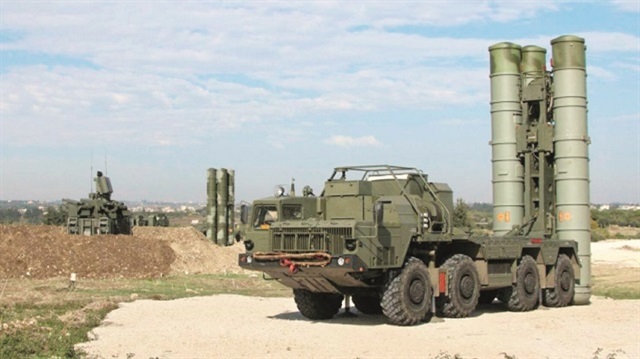
Turkey’s purchase of Russia’s S-400 missile defense system disturbs the United States, who aims to leave Turkey defenseless.
While Turkey is preparing to sign an agreement with Russia for the S-400 missile in quest of a long-range air defense system, the United States once again comes into play with the objective of hindering the agreement. The U.S.’s objection to this purchase, which is crucial for the security of Turkey’s air space, is not considered as well-intentioned, taking past experiences into consideration. The United States was revealed to have raised various difficulties as Turkey’s negotiated with the Chinese company that won the bid for long-range air defense. The U.S. first laid its NATO card on the table, and when that didn’t work, they threatened by claiming that that company was on the “black list”. The conditions imposed by the United States who offered to sell the Patriot antiaircraft missile were shocking.
An agreement has been reached with Russia regarding the technical studies on the S-400 air defense system. While the negotiations were finalizing, NATO started with its opposition. “They [Turkey] have not bought the S-400 air defense system from Russia. That would be a concern, were they to do that, but they have not done that ” the U.S. Chairman of the Joint Chiefs of Staff Joseph Dunford said Saturday. Turkey tries to overcome NATO’s obstructions by using the Russian missile within its own national air network, instead of integrating it into NATO’s network.
While Turkey has received no answer from its NATO allies regarding Turkey meeting its long-range air defense system needs so far, the country has always faced obstructions in search of alternatives. The most recent example is the long-range air defense system bid, which was annulled after China emerged victorious. During the negotiations with the Chinese company CPMIEC, it was revealed that the United States made various excuses and threats to ensure the cancellation of the bid.
According to reports, U.S. military authorities started pressuring Turkey so that this missile would not be integrated into NATO’s air network, right after Turkey signed an agreement with China. Turkey, in the presence of this claim, reciprocated by saying that the S-300 missiles of Greece have been integrated into NATO, and have carried out NATO missions. Following the persistence of the U.S. authorities, Turkey emphasized that the Chinese missile would not be integrated into NATO, and if necessary, and would be used within the national air network. However, this was not enough to convince Turkey’s ally, and the United States turned up the pressure. After a while, the U.S. made its final move, and told Turkey that the Chinese CPMIEC, which signed a long-range missile agreement with Turkey, had laundered money. Furthermore, they threatened Turkey saying that the U.S. may “investigate, and even punish Turkey regarding this, should Turkey enter into an agreement with this company”.
Turkey, stipulating the technology transfer and joint production model in meeting its long-range air defense system, did not accept the United States’ offer. Turkey tried to solve the problem with diplomacy, and the bid was cancelled. After other NATO states did not lean toward cooperation, Turkey decided to produce its own national system, and initiated its research. However, Turkey had to meet its needs in a short time due to the rising threat from the Syrian border, and difficulties created by NATO in deploying Patriot at Turkish border.
In terms of providing the long-range air defense system quickly, a two phase plan has been activated, direct procurement being the first, and joint production the second. To this end, Russia and Turkey agreed during negotiations. Stating that the Russian S-400 missiles would not be integrated into NATO’s network, Turkey, as a NATO member, signed a cooperation agreement with its NATO allies France and Italy, in order to meet its national defense system requirements. However, this alternative was also not sufficient for the United States. The latest statements of the Chairman of the Joint Chiefs of Staff caused doubts that the same play might be staged. It is estimated that the United States wants to leave Turkey defenseless, with their attempts to obstruct Turkey.
Preventing Turkey from purchasing a long-range missile, the United States agreed to sell the Patriot air defense system to Turkey. However, it did not make any discounts on the system, which is far more pricy compared to China’s offer. Moreover, the U.S. clearly denied Turkey’s demand of a technology transfer, and demanded a guarantee that Turkish engineers under no circumstances would interfere with the system. If the United States sold Patriot to Turkey, the batteries of Patriot, which costs billions of dollars, would be returned to the U.S. after its tenure, regardless of whether they were used or not, and Turkey would purchase a completely new system. As in the case with all defense systems, Turkey would have to inform the U.S. about where the Patriot missile was launched, and against whom it was used. The U.S. soldiers would also visit Turkey to count the missiles at certain intervals.
Hello, the comments you share on our site are a valuable resource for other users. Please respect other users and different opinions. Do not use rude, offensive, derogatory, or discriminatory language.
The floor is all yours.











